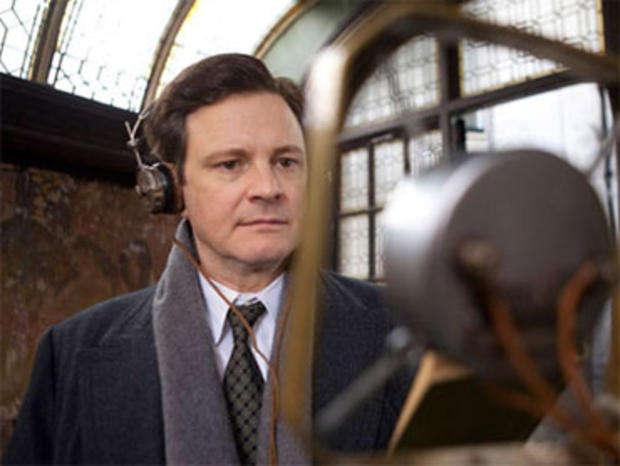How Oscar Frontrunner "King's Speech" may lose
It has become a safe bet in recent weeks that the frontrunner for the Academy Award for Best Picture is "The King's Speech," after a streak of wins by such predictive bodies as the Producers Guild of America, the Screen Actors Guild, the Directors' Guild of America, and the British Academy of Film and Television Arts.
Late last year the frontrunner had been deemed to be "The Social Network," which overwhelmingly took the top prizes from most every critics' group, including the New York and Los Angeles Film Critics, the Hollywood Foreign Press Association, and the National Board of Review.
History suggests that the Academy - whose older voting body is dominated by the Actors branch - would back a more traditional drama whose feel-good vibes are indisputable, in which the actors' gifts are more on display than a director's style.
Given the track record of inspirational or period films winning Best Picture over more groundbreaking dramas (or even comedies), "The King's Speech" looks like the prime Oscar candidate over a hip film about computer nerds dramatized through legal depositions, or an action film played out in people's dreams.
60 Minutes: The hidden letters behind "The King's Speech"
But the voting methods for Best Picture may actually do in that popular choice, depending upon what are the least popular choices for Best Picture.
Under the rules put into place when the Academy increased its roster of Best Picture nominees from 5 to 10, a form of preferential voting is employed in which Academy members fill out their ballots ranking nominees from 1 (favorite) to 10 (least favorite). Their ballots are then divided up into 10 piles, according to the number one votes. If there are not enough ballots in a single pile to determine a clear winner (a minimum of 50% from the Academy's 6,000+ members), then the ballots for the least popular number one choice are discarded.
But not thrown away. Instead, they are added to the other piles according to those ballots' Number 2 choice. If a single pile does not yet have the required minimum, the second-least popular pile is taken and re-distributed to their second choices, and so on, until one film has enough ballots to pass the bar.
By this method the Academy hopes to ensure a film with greater general appeal takes the top prize, by eliminating the weakest candidates early.
Suddenly those Academy members whose number one choice is a throwaway are now very important. And depending upon which of the ten nominees garner the fewest Number One choices, their fans will help sway the final vote one way or another.
For Best Picture: "The King's Speech"For Best Picture: "The Social Network"
For Best Picture: "Inception"
For Best Picture: "True Grit"
For Best Picture: "The Fighter"
If one assumes that - in addition to "King's Speech" and "Social Network" - the most popular vote-getters would be "True Grit" (second in overall Oscar nominations, including Best Director, Actor and Supporting Actress), "Inception" (a box office hit that has won most technical guild prizes), and "The Fighter" (a sports drama with three acting nominees as well as Best Director), then the back of the field would include:
"Winter's Bone" - A small, dark indie drama (and a Sundance Grand Prize winner) with nominees for Best Actress and Best Supporting Actor;
"127 Hours" - A solo actor's showcase, but one whose editing and directorial flourishes only slightly soften a disturbing tale perhaps too queasy for some Academy members;
"Toy Story 3" - The biggest grossing and best reviewed film of the year, but a cartoon - and one expected to be rewarded in the Best Animated Feature category anyway;
"The Kids Are All Right" - Another actors' showcase, but a small, gender-bending story compared to "King's Speech"; and
"Black Swan" - Failing to get a Best Screenplay nomination, the psychodrama is best recognized as a star turn for Natalie Portman, who - like the hiker in "127 Hours" - also puts her body through hell.
All of these films break conventions in their subject matter (sperm donation, self-amputation) or execution (computer animation, bizarro head trip, or the antithesis of glamour). So it is probably safe to assume that Academy members who'd choose "Toy Story 3" as their first pick would prefer the technical innovation of "Inception" over "King's Speech," or that those who favor independent fare like "Winter's Bone" or "Kids" would also "like" better the revolution brought about by Facebook in "Social Network" than the revolution brought about by the wireless in "King's Speech."
For Best Picture: "Winter's Bone"For Best Picture: "127 Hours"
For Best Picture: "Toy Story 3"
For Best Picture: "The Kids Are All Right"
For Best Picture: "Black Swan"
With that in mind, even if "King's Speech" takes an early lead, the elimination of the 10th, 9th and 8th films from the vote counting may stack the deck in favor of the less conventional.
So it remains a horse race. Post time is Sunday evening, Feb. 27 at 8 p.m. ET.
